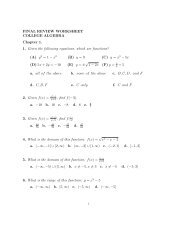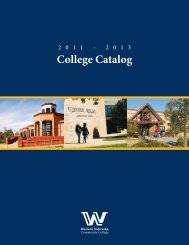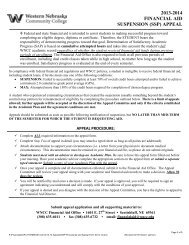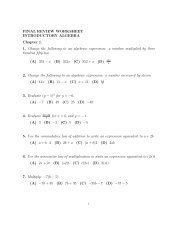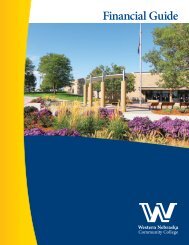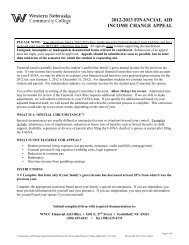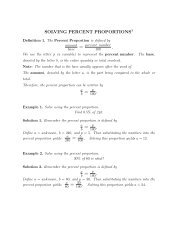WNCC 2010 Self-Study Report - Western Nebraska Community ...
WNCC 2010 Self-Study Report - Western Nebraska Community ...
WNCC 2010 Self-Study Report - Western Nebraska Community ...
You also want an ePaper? Increase the reach of your titles
YUMPU automatically turns print PDFs into web optimized ePapers that Google loves.
providing background and practical skills for a specific career area. These pathways are modeled<br />
directly upon the <strong>Nebraska</strong> model developed by Future Force <strong>Nebraska</strong>, which has determined a<br />
set of career clusters for career education intended to impart 21 st century skills to students, in<br />
collaboration with business and industry partners. At times, students are able to earn college credit<br />
while still in high school and to get a head start on a college degree while gaining exposure to the<br />
college environment. During the 2008-09 pilot offering, 50 students enrolled from Scottsbluff High<br />
School in Career Academies in Health Informatics, Therapeutic Services, Emergency Medical<br />
Technician Training, and Criminal Justice.<br />
Adult Education and ESL Services<br />
Another aspect of the range of lifelong learning occasions embraced by the College can be found<br />
in programs designed for students and adults who have not attained formal educational<br />
credentials. The Adult Education Program, which came under the sponsorship of <strong>WNCC</strong> in 1968,<br />
provides services to students sixteen years of age or older who are not currently enrolled in school.<br />
In order to stimulate learning and to facilitate the start to a successful learning career, the AE/GED<br />
teachers tutor students who have extreme difficulty in reading and/or writing. As of 2009, the<br />
program has sites in seven of the twelve counties within the Panhandle of <strong>Nebraska</strong> and offers<br />
GED preparation, Adult Education, English as a Second Language, and citizenship workshops.<br />
<strong>Community</strong>-based ESL programs exist at numerous locations throughout the Panhandle in an<br />
attempt to reach as broad a populace as possible. <strong>Community</strong> ESL courses, as distinguished from<br />
the academic ESL courses intended to prepare students to transition into transfer-level college<br />
work, are designed to help adults 16 years of age and older learn the four basic communication<br />
skills of listening, speaking, reading, and writing, especially as these abilities relate to everyday life.<br />
The courses are open entry and open exit, accommodating the needs of people who want a more<br />
flexible course focused on workplace and cultural activities.<br />
Locations for the AE Program include the community centers in the Native American and Latino<br />
communities of Scottsbluff, the County Detention Facility, the John N. Harms Advanced<br />
Technology Center, and other locations throughout the Panhandle. <strong>WNCC</strong> supports this program<br />
by providing classrooms and offices, graduation caps and gowns, professional development<br />
opportunities, and funding matches for the GED examiner. Approximately 250 students enroll<br />
annually, with about 100 graduating.<br />
<strong>Community</strong> Education<br />
In an effort to increase flexibility, convenience, and the availability of a full range of courses to<br />
actual and potential students in its service area, <strong>WNCC</strong> offers a wide variety of credit and noncredit<br />
classes through distance-learning formats. To promote greater student success in online<br />
classes, <strong>WNCC</strong> offers “Introduction to Online Learning” as an elective course designed to prepare<br />
students for success in the online learning environment by presenting necessary technical skills<br />
and exposure to electronic learning activities.<br />
Moreover, in a continuing effort to provide a broad variety of educational offerings, <strong>WNCC</strong> hosts a<br />
wide array of non-credit community education courses to provide lifelong learners opportunities to<br />
experience new areas of education, cultivate their interests, or enrich their personal or professional<br />
skills. Between the fall term of 2005 and summer session of 2008, <strong>WNCC</strong> offered over 2,300<br />
<strong>Western</strong> <strong>Nebraska</strong> <strong>Community</strong> College Page 137



